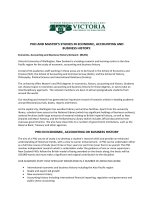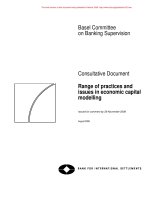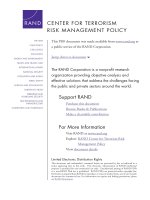Studies in Economic Nationalism pot
Bạn đang xem bản rút gọn của tài liệu. Xem và tải ngay bản đầy đủ của tài liệu tại đây (14.81 MB, 232 trang )
STUDIES
IN
ECONOMIC
NATIONALISMPUBLICATIONS
DE
L'INSTITUT
UNIVERSITAIRE
DE
HAUTES
ETUDES
INTERNATIONALES
-
N°
36
MICHAEL
A.
HEILPERIN
STUDIES
IN
ECONOMIC
NATIONALISM
LIBRAIRIE
E.
DROZ
8,
rue
Verdaine
GENEYE
1960
LIBRAIRIE
MINARD
73,
rue
Cardinal
Lemoine
PARIS
ye
the
Memory
of
my
Teachers a
nd
Friends
WILLIAM
E.
RAPPARD
and
PAUL
MANTOUX
Founders
of
the
Graduate
Institute
cf
InternationaI Studies
there
is much desire
to
learn,
there
of necessity will
be
much
arguing, much writing, many opinions; for opinion in good men is
but knowledge in the making.
John Milton:
Areopagitica (1644).
I shall venture to acknowledge, that, not only
as
a man, but
as
a British subject, I pray for the flourishing commerce of Germany,
Spain, Italy, and even France itself.
David Hume:
Of
the Jealousy
of
Trade (1742).
Das ist die Eigenschaft der Dinge:
Natiirlichem geniigt das Weltall kaum;
Was
kfinstlich ist
t
verlangt geschlossnen Raum.
(Such is the nature of things: the
univE'rse
is barely sufficient for
what
is natural; but what is artificial requires closed space.)
Gcethe:
Faust,
Part
II,
Act
2.
There is
no
social phenomenon more universal
in
its incidence, nor
more far-reaching for the future of mankind
in
its consequences, than
economic nationalism to-day.
William E. Rappard:
Economic Nationalism (1937).
I desire freedom
as
an end in itself. I desire order
as
a means to
freedom.
I hold that if freedom
is
to be preserved and progress
assured, we must look outside collectivism for an answer. We must
look to a system
in
which there is truly independent initiative and
truly dispersed power. .
If
we did not know a better system than
overall collectivism, we should have to create it.
Lionel Robbins:
Freedom and Order (1955).
This short and unpretentious book is a by-product of the com-
prehensive - and as yet unfinished - inquiry into economic nationaI-
ism in the twentieh century which I have intermittently conducted
fqr
many years. The chapters of which it is composed were written in
the first place
in
order to clarify
my·
own ideas; and they have also
served me for some
of
the lectures delivered
at
the Graduate Insti-
tute of International Studies during the academic year 1958-59.
My reason for deciding to publish what is assuredly an incomplete
treatment of a most important subject, is that apparently no volume
of this particular scope exists today. I have also been prompted
by
the encouragements given
me
by my friend, Professor Jacques Frey-
mond, Director of the Graduate Institute, and by his hospitable offer
to include the book in. the series of the Institute's publications. Thus
provided with an opportunity to render
at
this most appropriate place
my heartfelt homage to the memory of two great and ever-regretted
friends and teachers, Professors William E. Rappard and Paul Man-
toux, who founded the Institute thirty-two years ago,
lowe
to their
eminent successor a debt of gratitude very large indeed.
The content of this book has been the subject of conversations
and discussions with scholars of many countries, to all of whom my
warm thanks are here expressed.
As
it is a highly controversial study,
however, no names
are
mentioned
and
I alone bear the responsibility
for what it contains.
To
my wife go my affectionate thanks for her encouragement
and
a moral support that never falters.
As
I write this preface on the day on which the University of
Geneva is four hundred years old, I wish to pay my grateful tribute
to my famous and venerable Alma Mater, to which
lowe
both my
-
10-
academic training and
my
first teaching experience and with which
I have been again associated, albeit somewhat indirectly, over the
past
few years.
Four hundred years: what a span
of
experience this covers
in
the
history
of
economic
nationalism! When Calvin's Academy was
founded, mercantilism was
in
its youth. It grew, flourished, declined,
and fell; then came the age
of
liberalism and free trade and the great
txpansion
of
international commerce and economic development.
World War
I destroyed the liberal world trading system and there
followed the ill-fated efforts
to
rebuild it
in
the twenties. The Great
Depression of the thirties ushered
in
the most virulent forms
of
economic
nationalism the world has
ever
known.
As
these pages
go
to
press, liberalism and internationalism are triumphantly returning
in
Western Europe, the struggle against protectionism
in
the United
States
is
rife; but
in
most
of
the underdeveloped countries
economic
nationalism prevails, as it does,
of
course,
in
the totalitarian countries
of
the communist
bloc.
The balance
of
this century
will
be
of vital importance for the
future
of
international co-operation, which,
to
a large extent,
will
depend
upon
the fate
of
economic
nationalism. It
is
my
hope that
this slender
volume
may
help
better
to
understand the issues involved
and the stakes
which
are
so
high
in
terms
of
individual happiness and
of
peace and welfare for
alL
M.A.H.
Geneva,
June
5,
1959.
CONTENTS
PART
I:
In
Quest
of Perspective
Chapter I:
What
is Economic Nationalism?
15
Chapter II: Economic Nationalism, Collectivism
and
Liberalism
28
Chapter III: Economic Nationalism through the Ages .
44
PART.
II:
Proponents of
Economic
Nationalism,
Past
and
Present
Section
1:
The
inheritance
from
the
Past
Chapter IV: The Mercantilist
Heritage
Chapter V: Fichte's Blueprint for Autarky •
Section
II:
Twentieth
Celltury
Doctrines
Chapter VI: The Economic Nationalism of John Maynard Keynes
Chapter VII: Economic Nationalism since 'World
War
II: Collect-
ivist Planning and Economic Nationalism
APPENDIX:
Introduction
1.
The Economic Foundations of Collective Security (1943)
2. Prosperity
versus
Peace: The Political Consequences of a New
Economic Fallacy (1947)
3.
An
Economist's Views on International Organization (1950)
4. Notes on the Havana
Trade
Charter (1948)
5.
How the U.S. Lost the I.T.O. Conferences (1949)
6. Economic Nationalism
as
an Obstacle to Free World Unity
(1952) .
7. U.S. Foreign Economic Policy (1958)
67
82
97
129
153
155
173
181
190
201
210
224
I
IN
QUEST
OF
PERSPECTIVI
,I
WHAT
IS
ECONOMIC
NATIONALISM?
C.
K.
Ogden, the great semanticist and inventor of "Basic
English", is reported to have commented on the saying: "words are
convenient noises" by remarking that no more than one thousand of
them have any precise meaning. This is particularly true of
words relating to human affairs! The reason for this unsa-
tisfactory state of affairs is not hard to find. Social relationships
(political and economic) are extremely complex
and involved;
social "realities" are changing almost as fast as a student can
commit their description to paper- or faster; emotions become
involved in matters affecting the happiness, the prosperity, and the
future of individuals and groups; and words often acquire explosive
political qualities even before they are clearly defined. Add the fact
that the situation, condition or relationship covered by a term changes
frequently - and often imperceptibly - thereby causing an eventual
need for redefinition, recognized only after more or less delay -
if
at
all. ,Life has a way of breading homonyms without anyone becoming
aware of them for a long time. The
ve~bal
jungle in which the man
in the street and the social scientist both live has become in recent
decades a 'very "dangerous place indeed.
Words,
as
was well observed during the past war, are weapons.
Indeed, there are words which are sticks of dynamite, just awaiting
detonation.
The "dynamite words" are the stock-in-trade of the
demagogue and the scholar's nightmare. Among 'them there are
words which exist for evil purposes alone; and there are words which
have a
Jekyll-and-Hyde .existence, now respectable terms with every
appearance of objectivity (if not' always
of
clarity), now slogan-like
fighting words with which to inflame the mob. It has been
my
ende-
-·16
-
avour to avoid,
as
far as possible, all such terms. In this book, the
principal theme of which is
economic
nationalism,
I am concerned
with the problems of collectivism and liberalism
as
well, an
area
in
which many emotional words are in current use. For my
part
I use
the term "collectivism", rather than "socialism", "fascism", or
"communism". And I speak of "free enterprise", of "liberalism",
and of the "market economy", but avoid using the ambiguous term
"capitalism", especially without qualification. Concern for the clarity
of the terms used in this book leads
me,
as I have been led in earlier
writings, to devote particular attention to the problem of definitions.
Both this and the following chapter have unavoidably a considerable
Usemantic" tinge. Yet to avoid misunderstanding is worth a moderate
amount of what may strike some of my readers as excessive
"pedantry". Indeed the use of ambiguous words without a definition
ought
to
come to be regarded as intellectual bad manners, and this
not in academic circles alone.
II
After these preliminary observations, my first task is to define the
term
economic
nationalism.
Let us note in the first place that it relates
to a set of national policies which regulate the relations between a
country and the rest of the world. The policies covered
by this term
are very ancient, the term itself is of very recent origin.
In
the
seventeenth and eighteenth centuries - indeed from the sixteenth
century onward - one spoke of
.mercantilism or of the "mercaritile
system". When the system was dismantled in the early
part
of the
nineteenth century, the opposite to free trade was known as "pro-
tectionism". During the reconstruction period which followed the end
of World
War
I, "protectionism" was still the most widely used
phrase. Although there may have been earlier uses of the term
"economic nationalism", the first instance that
I have found, pro-
minently displayed, is in the title
ofa
book by Leo Pasvolsky,
published by the Brookings Institution in Washington in 1928:
Economic
Nationalism
of
the
Danubian
States. It was after the out-
break of the Great Depression and the collapse of the precarious
reconstruction of world economy achieved during the twenties, that
the term
economic
nationalism
began to be more widely used. It is
-17-
found for example - alld this is
,symptomatic,-
as
the title of a
small -volume published in a reference series in New York, in 1933.
J
It
was
in' the thirties
that
the term
economic
nationalism,
and
the
concept
it
covers came into general use
as
something considerably
at
variance
with
what
was
called
"protectionism"
during.
the
nineteenth
and the earlier
part
,of
the twentieth centuries. Wherein the difference
lies will
be
seen presently. I
tmay
be
briefly suggested here that the
new notion of economic nationalism is closely bound up with the new
collectivist philosophies -
and
policies - of the inter-war decades
and
expecially of the decades following 1930.
Protectionism,
in the
older sense of the
word,belonged to a liberal age.
It
was in con-
formity -
and
not in contradiction - with the operations of the price
system, of the market economy
and of individual private enterprise.
Collectivism,
as
will also be shown below, is based on a philosophy
of society
at
variance with the entire Iibetal tradition of the West.
III
To
revert, however, to the task of providing a definition of the
phrase:
economicnatiotzalisnz.
We
can do no better, to begin with,
than to turn to the
ma'st authoritative student of this subject,
Pro-
fessor William E. Rappard.
In
his address on "Economic National-
ism" delivered
at
the Harvard Tercentenary Conference of Arts
and
Sciences, he made the following pertinent comments:
To define economic nationalism as the economics of nationalism
would be neither accurate nor illuminating.
It
would be inaccurate, because the policies which some acclaim
as economic nationalism
in
their own country and which all denounce
as such
in
their neighbours' are today practised by all nations, not
all of
whom
are animated by the spirit of nationalism. Nor would
such a definition be illuminating, because nationalism itself would
1
G.
G.
Hodgson: Economic Nationalism, The Reference Shelf, New York,
The H.W. Wilson Company,
1933.
This short book is a compilation of
texts from the economic literature relating to economic nationalism.
The
experimental
character
of
the
terminology
used
appears
from
the
following
sentence
in
the introduction: "At best economic nationalism is an indefinite
term, used by its opponents, more.than, by its proponents."
It
is of interest
to note that any texts reprinted
in
the book which use the expression "eco-
nomic nationalism" are posterior to
1930.
-18
-
remain to be defined. Economic and political nationalism,
if
they
cannot be regarded merely
as
two aspects of one and the same
reality, are, however, so closely related one to the other that we
can
in
no
case avoid the necessity of defining the latter if we wish
fully to understand the former.
Nationalism, then, is the·doctrine which places the nation
at
the
top of the scale of political values, that is, above the three rival
values of the individual, of regional units, and of the international
community.
2
Professor
Rappard
goes on to
say
that
"a
nationalistic ruler of a
nationalistic
state
will be more tempted to practise economic
nationalism than a liberal ruler of
an
individualistic state",
but
also
observes
that
"contemporary economic nationalism is
by
no means
characteristic of nationalistic states alone." It follows
that
"it
can
obviously not
be
correctly defined solely
by
reference to [political]
nationalism."
S And so, having discarded the "obvious",
but
incorrect,
definition, our author pursues
an
inquiry into the economic literature
of
the
past
two centuries,
and
finally arrives
at
the
following
definition:
11
we wished to define economic nationalism by its underlying
purpose, we should say that
it
was a doctrine destined to serves the
nation by making it not richer, but freer, by promoting not its ma-
\1
'.
terial welfare, but its independence of foreign influences
Economic
nationalism is the policy of national self-sufficiency.
4
, :;" ~.~
-
.
Professor
Rappard
then proceeds to show how this definition of
economic nationalism
as
a policy destined to promote national self-
sufficiency may
be
justified both
by
the pronouncements of its leading
exponents
and
by
the analysis of the measures taken to attain its
aims.
The
latter
are
summarized
as
follows:
First, economic nationalism seeks to limit
the-
nation's con-
sumption to those goods which are the fruit of its own soil and
labour. By appeals to patriotism, as well as by the more drastic and
effective means of
tariffs,quotas,.
exchange controls, and outright
prohibitions, nations are urged to prefer national products
and
2 Authority and the Individual, Cambridge, Mass.,
1937,
pp. 77-78.
a
Ibid.,
p.
80.
, Ibid., pp. 83-84.
-
19-
constrained to forgo the enjoyment of foreign commodities and
services.
Secondly, economic nationalism seeks to promote the domestic
production of all those commodities for which the national needs
are
imperative.
.
Thirdly,
economic nationalism is apt to raise the cry for
more space, that is, for annexations of neighboring or colonial
territories
As
no
measure of restriction of imports, of stimulation of home
products, and of territorial expansion can possibly make any state
entirely
self~sufficient
under modern conditions, economic natio-
nalism seeks, fourthly, to secure a favourable balance of payments,
and thereby to promote an influx of gold.
In
this,
as
all other
respects, present-day economic nationalists show themselves to be
the legitimate offspring of their mercantilist ancestry.
IS
Thus
economic
nationalism
is not only defined with precision
but
also illustrated through its major policies. Some further elucidations
may, however, be in order. In the first place,
let
us distinguish
between self-sufficiency (or autarky
6),
as
an objective of policy, and
self-sufficiency
as
a by-product of a policy which has primarily other
objectives
in
mind. Thus, for example, tariff protection granted to
some industry for the sake of conciliating politically influential
elements results in reducing the country's imports of corresponding
foreign-made products and, accordingly, increases the country's self-
sufficiency -
but
autarky is not the deliberate
aim
of most policies of
"straight"
tariff protection.
The
protection of "vested interests"
apart
(which, although it leads to an aggravation of economic nationalism,
is not essenially
an
expression of it), these
are
the three principal
reasons why a country might strive for self-sufficiency:
(a)
The
desire to be as· independent
as
possible
of
sources of
supply
that
lie outside the country's control, in· order to
be
strong
in war.
For
most governments which contemplate
aggressive warfare, autarky is a prelude to conquest - and,
IS
Ibid.,
pp.
85-87.
6 Autarky- a word of Greek derivation - is the technical .term for self-
sufficiency.
It
wilt be used frequently throughout this book. See A.G.B.
Fisher: Economic Self-SUfficiency,
Oxford
Pamphlets
on
World
Affairs,
No.4,
Oxford, 1939.
-20-
as
will be shown later '1, conquest is a means to achieve
autarky.
(b)
The
desire to achieve a greater degree of diversification of
production and a better-balanced national economy. Such
diversification is here regarded as a means of increasing both
national prosperity and national power. These policies are
often considered by their advocates to be temporary, albeit
0'£
indefinitely long duration. 8
(c)
The
desire to plan the economic life of the country
asinde-
pendently as possible
of
the condition of the world economy.
Here autarky becomes a policy, if not of economic isolation,
at
least of economic insulation.
These motivations. and their implications are examined in later
chapters of this book. For the present it will suffice
to
identify each
line of thought by the name or names of its leading exponents. Thus
the autarky of power and ,conquest goes back to the days of the
mercantilists, but its most consistent intellectual framework was
formulated
by
the German philosopher Joham Gottlieb Fichte (1800).
Policies aimed
at
developing
a.
country's industries by deliberately
restricting its imports were
first consistently formulated by Alexander
Hamilton (1791) and later
'-
and more fully -
by
the German eco-
nomist Friedrich'List (1841). The concept of economic insulation is
much more recent and has many modern advocates, none of whom
has been more brilliant or more.influential than the la Lord Keynes.
9
In this century, argument
(b)
was very often used in the twenties,
argument
(a) in the thirties (especially by Fascist Italy and Nazi
Germany, not forgetting the Soviet Union, which uses
it still), while
a combination of arguments
(a) and (c) is a "creed" very widely
accepted since the Great Depression and to the present day. It is a
combination typical of the contemporary convergence of economic
nationalism and collectivism. Its adherents favour policies
of-
autarky
not so much because they desire national insulation for its own sake
'1
See Chapter
V.
8
In
textbooks, this line of reasoning is usually called the "infant
in
dustries" argument for protection.
9 His principal writings along this line were published
in
the thirties.
See below, Chapter
VI.
-21-
as
because they
want
to
be
free from the "disturbing effects" of
international economic interdependence. Believing;
as
they do,
in
the
virtues of States control over economic life, they distrust economic
developments which, because they occur abroad, cannot be subjected
to national control in the way
in
which purely domestic developments
are
so
subjected.
IV
Before
pursuing
any
further
this
inquiry
into
the
nature
of
economic
nationalism,let
me comment very briefly on nationalism
tout
court.
The
subject is wide - too wide indeed to be treated here
in
any
detail.
The
following two quotations, however, taken from the
writings
.of careful and profound .students of nationalism, express
a point
of
view which should
be
submitted to the readers of these
pages.
The
first quotation is from Professor Toynbee's A Study
of
History:
Industrialism and Nationalism, rather than Industrialism and
Democracy, are the two forces which· have
.exercised domination
de
facto over our ·Western Society
in
our age; and during the
century that ended about
A.D.
1875,
the Industrial Revolution and
the contemporary emergence of Nationalism in the 'Western World
were working together to build up "Great Powers" each of which
claimed to be a universe
in
itself. Of course this claim was false
Every Great Power also aspired to be
a substitute for Society in
the sense of being self-contained and self-sufficient, not only in
politics and economic but even
in
spiritual culture. The state of
mind thus engendered among the people of communities which
constituted Great Powers spread to communities of lesser calibre.
In
that age
in
the history of our Western ,Society all national states,
from the greatest down to the least,
put
forward the same claim to
be
enduring entities, each sufficient unto itself and independent of
the rest
of
the world.
10
This
tendency, Professor Toynbee noted,
was
checked through
the consequences
of
World
War
I.
Writing
in the early thirties he
found
that"
all States alike
are
feeling less
and
less able to
stand
by
10
Arnold
J.
Toynbee: A Study of History, London, 1934, Vol. I, pp. 9-10.
-
22-
themselves economically", and that "all
but
the strongest or the most
recalcitrant states are also beginning to feel the same lack of self-
sufficiency on the political plane
and are displaying a readiness to
accomodate their sovereign independence to the international
pro-
cedure of the League
ofN
ations Council and Assembly or to some
other form of international limitation and control.
" 11
In the later thirties this hopeful tendency
was
again reversed and
autarky became the most potent and widespread slogan; and since
the end of World
War
II the quest for a revival of an international
consciousness in all nations is marred
by
the virulence of nationalism
in general and economic nationalism
in
particular.
The second quotation is from the pen of Professor Rappard:
Nationalism
has
been defined
as
a scheme
of
moral .values in
which the nation
or
the nation
state
stands
supreme. On the one
hand, the nation is superior to the
individual-hence,
in
totalitarian
nationalisms, the repudiation of all political freedoms
and
the denial
of
all constitutional rights. On the other hand, the nation is also
superior to
humanity-hence
the opposition to all efforts to or-
ganize the international community, the revolt
against
all endeavours
to limit national sovereignty.
The
deliberate subordination
of
the
individual
and
of
humanity
at
large
to
the nation, administrative
centralization too,
that
is 'to say, the sacrificing
of
all regionalism
to national unity, such,
it
appears
to me, is the fundamental doctrine
of
philosophic
and
political nationalism which
today
dominates
and
disrupts
the· world. 12
This,then,
in all its distressing rawness, is the moral climate of
modern nationalism.
v
Additional light may be thrown on the notion
of
economic
nationalism by relating this concept to that of "national economic
policy". It would seem superfluous to elaborate what surely ought
to be clear to all, were it not that symptoms of unexpected confusion
occasionally appear
in
this connection. Thus, to quote from personal
11
Ibid.,
Vol.
I,
pp. 14-15.
12
William E. Rappard: "Qu'est-ce que
Ie
nationalisme economique," in
Introduction
a
l'
etude
de
Droit
compare,
collection
of
studies
in
honour of
Edouard Lambert, Paris,
1938,
Vol.
III,
p.
400.
-23-
experience, a reviewer discussing a previous book
of
mine
13
and
having reproached me with "never clearly defining" the concept of
nationalism, went on
as
follows:
If we take it [the concept of nationalism] to mean broadly promo-
tion
ofnaHonal
interest, it is difficult to
square
its alleged male-
ficence with the persuasive argument made for international cooper-
ation
as
the means
of
enhancing the selfsame interest. If only the
narrow manifestations of nationalism are being attacked and a
distinction is inferred between the pursuit of real and illusory self-
interest, the wholesale condemnation must be qualified. Although
a policy
of
co-operation is more prudent than one of isolation, both
can be considered nationalistic.
l'
The
above is
an
illuminating instance
of
how
greatly the notions
of
"nationalism
tt
and
"national policy" can become mixed.
To
resolve
the confusion
and
thereby provide the reader with a
further
insight
into
what
economic nationalism is,
m,ay
I be excused for quoting the
following observations from
an
earlier volume
of
mine; they were
written twenty
years
ago
and
express the attitude I have maintained
throughout my studies
of
economic nationalism:
In
a world divided into a certain number of sovereign States,
policies are national. They are national not only when they are
independent of policies carried out by other States, but
also, when
national policies of the different States (some
or
all) are co-ordinated
and harmonized with one another.
It
may seem a commonplace, but
it is essential to realize that even policies resulting from an inter-
national agreement are national policies.
What
can be called
an
"international policy"
is
a'set
of co-ordinated national policies, the
aims and means of which are combined into an alleged harmonius
whole. We can then
.describe the individual national policies
as
"internationalism". The difference between that and nationalism
is to be found
in
the fact that the latter subordinates the state
of
international relations to the realization of purely national .ob-
jectives.
lIS
All
policies, then)
are
national policies
18
-
but
they can
be
guided
by
a nationalistic concept
of
national interest
or
by
an
internationally
13
The Trade
of
Nations, New
York,
1947.
14
New
York
Times
Book
Review,
June
15,
1947,
p.
28.
15
Michael
A.
Heilperin: lnternatlonal Monetary Economics, London,
1939,
p.
3.
16
The
Social Science Research Council, New York, when appointing in 1934
a
commission
to
study
the
foreign
economic
policies
of
the
United
States,
-24-
inspired concept. A government can adopt policies of autarky, of
insulation, of protectionism - or policies of international co-
operation or even free trade. The former will be an expression of
economic nationalism - not
the
latter.
The
relationship between
Hie
individual and the state also has a great impact upon the nature of
national economic policies directed towards the outside world.
The
smaller the powers of the government in economic matters, the freer
are individuals in their commercial and financial· relations, and the
less opportunity there exists for practices of economic nationalism.
The larger, on the other hand, the government's powers to control and
restrict the economic activities of individuals, the more scope there
is· for nationalistic policies. Indeed, there is a clear connection
between
economic
internationalism and
.liberalism,
.on the one hand,
and
economic
nationalism and
collectivism,
on the other. It is these
two concepts,
collectivism and
liberalism,
which I shall endeavour to
define,
in
Chapter II,
in
their relation to economis nationalism.
VI
The line of thought developed in the previous section of this
chapter might lead to a definition of economic nationalism wider than
that proposed by Professor Rappard. Thus economic nationalism
might be defined as all those national policies which tend to make
the economic intercourse between residents of a country and people
living beyond its boundaries more difficult than is economic inter-
course among people living within the country.
Now.
this definition
would include protectionism within the concept
ot
economic national-
ism, which thus might appear
at
first glance to
bea
distinct advantage.
The more restrictive
definition~
by equating economic nationalism
with policies aimed
at
national self-sufficiency, excludes from its
scope policies which
interfere with international economic relations
but
without effectively insulating a country from the outside world.
For a long time my own preference has run to the wider concept,
which seemed
to
me to be "operationally" simpler and more objective
than the concept covered by the narrower definition. By degrees,
was well inspired when it named this group "Commission of Inquiry into
National Policy
in
International Economic Relations".









